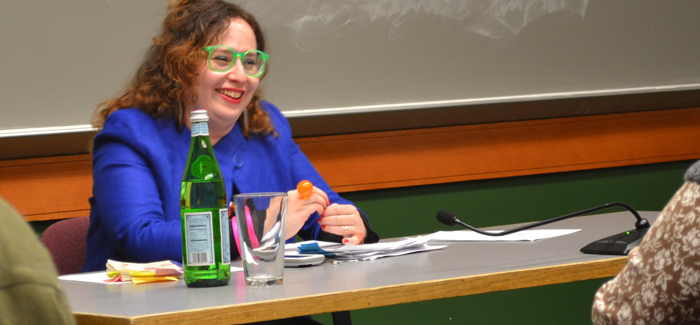
(Photography by the Renaissance Society)
Poet Dorothea Lasky leaves her audience awestruck.
In an episode of the NBC comedy 30 Rock, Alec Baldwin warns Tina Fey to never follow a hippie to a second location. Sage advice if you want to stay safe. But if you don’t mind getting a little dangerous, maybe you should follow that hippie.
Dorothea Lasky’s poems are all about second locations. Through her three published collections—AWE (2007), Black Life (2010), and Thunderbird (2012; all published by Wave Books)—and distinctive live readings, Lasky takes her audience to unexpected places. The simple beginnings of many of her poems—often a silly remark or plain-spoken declaration—make these places all the more surprising. At her poetry reading in Cobb Hall last month, several such opening lines garnered chuckles from the crowd:
I like weird ass hippies
And men with hairy backs
(“I Like Weird Ass Hippies,” Thunderbird)
and
Have you ever read a book called AWE?
I have. I wrote it. That’s my book.
I wrote that book. I wrote that one.
(“Ever Read a Book Called AWE?” Black Life)
There’s something childlike here, disarming the listener through humor. Lasky’s animated manner and eccentric style supported this feeling. On the night of her reading, inside a room crowded with wool-swaddled undergrads, Lasky wore an electric blue blazer; glittery flats; red, red lipstick; and enough fluorescent accessories to illuminate the building should the power cut out. Her light and humor also came through when addressing the audience in between poems. Before reading “Why Poetry Can Be Hard for Most People,” she paused and smiled: “I’m not talking about you people—other people.” She prefaced several pieces by polling the audience on the poems’ subjects—Do you like hippies? Do you like porn? Do you like orange flowers?—as though addressing a shy classroom. Most of her questions were met with a tickled, nervous silence.
Before one poem she said, “Do you like irony at the University of Chicago?” her voice high and light.
Here the crowd finally nodded and audibly assented.
“This next one’s called ‘I Hate Irony.’”
Through poetry, Lasky is a manically happy cartoon beneath which runs something much darker, something closer to the abyss. For her, it’s all about that second location. There she’s talking about death and the afterlife, gender and sex, rejection and loneliness. She’s calling herself Jesus. She’s saying, “My poems about corpses will always be about you.” Such proclamations were made all the more bold because she delivered them so plainly and with so much authority. Consider these closing lines from the same poems as above:
So get your cut-up heart away from
What you think you know
You know, we are all going away from here
At least have some human patience
For what lies on the other side
and
When you look over a big green field
And the dead soldiers lay all around you, that’s Love
That’s Love and Awe.
Say it
That’s Love and Awe.
There is nothing better.
Or if there is
Then I don’t care
For the latter half of the night, she read from her new collection, Rome, telling the crowd that she was trying it out on us before it was published. When is the manuscript due? a man asked.
“Monday,” she replied. “We’ll see how this goes,” she said, her voice dropping lower, her laughter coming from deeper inside her gut.
After a few of these poems, she asked, “How do you like the book so far?” her question hopeful but also self-aware. “Just kidding,” she said, her chin dropping, her voice dipping down into that humored, conspiratorial tone. “We can talk about it later.” Perhaps when we follow her to wherever she’s going next.
Video
Dorothea Lasky reading presented by the Renaissance Society with University of Chicago Poem Present.
